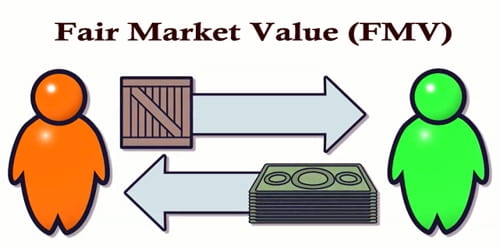Fair Market Value (FMV)
Introduction:
Fair market value (FMV) is the reasonable selling price for an enterprise, stock, real estate, or other assets. An estimation of the fair market value may either be based on precedent or extrapolation. Fair market value varies from an individual’s intrinsic value on the same commodity depending on their own desires and circumstances.
It is a term commonly utilized in tax and realty, FMV has come to represent the value of an asset under the subsequent usual set of conditions: Prospective buyers and sellers are reasonably intimate with the asset, behaving in their own best interests, freed from undue pressure to trade and given an inexpensive period for completing the transaction. Given these conditions, an asset’s fair value should represent an accurate valuation or assessment of its worth.
A legal right taking, in lieu of a property sale, wouldn’t be considered a good market transaction since one in each of the parties (in this case, the seller) was under undue pressure to enter into the transaction. Other samples of sales that might not meet the test of fair value include a liquidation sale, deed in lieu of foreclosure, distressed sale, and similar styles of transactions.
People always believe that homes, paintings, stocks, bonds, and other things are a certain amount “worth” on the market, but the only true measure of fair market value (FMV) is the price at which somebody is willing to sell and somebody is willing to buy.
Example:
Let’s assume John Doe wants to sell his house. He lists it for $750,000. Jane Dale wants to shop for a house. She sees John’s house purchasable and offers him $675,000. Thetwo2 negotiate the value and agree on $700,000. Because it’s the worth John and Jane comply with, the fair market price (FMV) of the home is $700,000.
The term fair market value (FMV) is intentionally differentiated from related concepts such as market value or appraised value because it takes into account the fundamental values of free and open market operation, while the term market value merely refers to the market price of an item.
The term fair market value (FMV) is utilized throughout the inside Revenue Code among other federal statutory laws within the USA including Bankruptcy, many state laws, and a variety of other regulatory bodies. In litigation in many jurisdictions within the us, the fair value is about at a hearing. In certain countries, the courts are forced to hold fair market hearings, whether the lenders or the loan guarantors surrendered their right to such a hearing within the loan documents or not.

Fair Market Value (FMV) is Vital for Real Estate Transactions: Here are three main reasons why knowing the fair market value (FMV) is important for valuing, buying, or selling a home:
- For Ownership Transfer – Equal market value is crucial to understanding that land ownership is being transferred anytime. Knowing the fair market value helps a homeowner to better appreciate the value of its property in order to avoid taking advantage of it. It also helps the buyer know how much of a property is too much to pay for.
- For Tax Purposes – Worldwide tax authorities always ensure that transactions are carried out at FMV, at least for tax purposes, especially those made between people not dealing at arm’s length. Municipal property taxes are often assessed supported the fair value of the owner’s property. Because the difference between the acquisition price and also the property’s fair value is substantial, tax authorities have an interest in knowing the present fair market price.
- For Insurance Purposes – The fair market value is most commonly used in insurance. For example, if an insurance claim is made as a result of a house burning down, the insurance company that covers the loss will often cover only the amount up to the fair market value.
- Uses of Fair market value (FMV): Fair market value (FMV) generally means the most effective price, expressed in dollars, that property would begin an open and unrestricted market between a willing buyer and a willing seller who are knowledgeable, informed, and prudent, and who are acting independently of each other. FMV refers to the price that folk might reasonably expect to induce for his or her items on the open market.
Fair market value (FMV) is often used commonly in the insurance industry. For example, when an insurance claim occurs as a result of a car accident, the insurance provider that covers the damage to the vehicle of the owner typically covers costs up to the FMV of the vehicle.
Information Source:
















